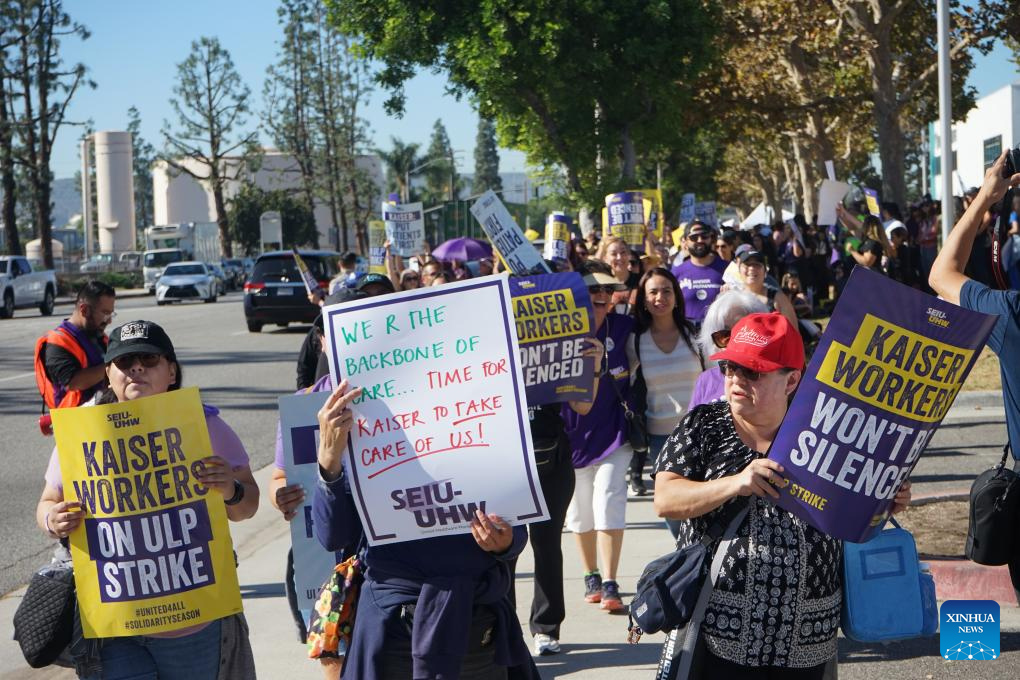U.S. healthcare workers begin their largest strike for better pay

Health-care workers protest outside a Kaiser Permanente medical center in Baldwin Park, California, the United States, on Oct. 4, 2023. Workers at Kaiser Permanente, the United States' largest health-care nonprofit organization, began a strike Wednesday morning that is expected to see more than 75,000 union members walk out of hospitals and medical offices after the company and labor negotiators failed to resolve a dispute over staffing levels. (Photo by Zeng Hui/Xinhua)
SACRAMENTO, the United States, Oct. 4 (Xinhua) -- Holding signs and ringing handbells, tens of thousands of healthcare workers took to the picket lines on Wednesday at hundreds of hospitals across the United States, seeking better pay and benefits through what is called the largest healthcare worker strike in U.S. history.
More than 75,000 employees of Kaiser Permanente, a leading nonprofit health provider in the country, walked off the job Wednesday morning after their unions and the healthcare giant failed to reach a new contract agreement on Tuesday.
The strikes will run through Saturday at dozens of locations across the states of California, Colorado, Washington, Virginia, Oregon, and Washington, D.C.
California, where Kaiser is based, will be the most affected by the work stoppage, as more than 68,000 of the participating workers are in the state.
Outside a Kaiser facility in Sacramento, California, hundreds of employees and their family members rallied and held signs that read "Kaiser workers won't be silenced" and "Respect and value healthcare workers." Media footages showed similar scenes in other cities like Los Angeles and Irvine.
The workers on strike include nurses, X-ray and lab technicians, medical assistants, pharmacists and others. They are represented by the Coalition of Kaiser Permanente Unions, a coalition of their local unions.
The previous four-year contract expired on Sept. 30. Union leaders are demanding long-term investments to address a staffing shortage in addition to better pay and benefits.
They ask for across-the-board pay increases of 6.5 percent in the first two years and 5.75 percent in the two years after, but Kaiser offers 3 percent for each year, according to the union coalition's update on Sept. 30.
The union coalition said frontline healthcare workers are "burnt out and stretched to maximum" while the staffing crisis has led to "unsafe working conditions and deteriorating care for patients."
In the videos posted at the coalition's website, Kaiser employees said due to short staffing patients had to stay in hospital longer and they were burnt out by long working hours. Those paid at less than 25 U.S. dollars an hour complained that their wages couldn't make ends meet and the inflation added to their financial stress.
The union coalition accused Kaiser executives of continuing to "bargain in bad faith" despite the organization reporting more than 3 billion dollars in profits in the first half of this year.
The three-day strike will be "the initial demonstration of our strength," said the coalition in a statement. The workers are prepared for "another longer, stronger strike" next month when additional members in Washington state can join the strike with their contract expiring on Oct. 31, it said.
The work stoppages could cause delays for patients in getting medical appointments, lab results and prescriptions. Non-urgent procedures might be postponed, and some clinic hours might be reduced, warned Kaiser. But hospitals and emergency departments would remain open during the strike, staffed by doctors, managers and other non-union "contingency workers," it said.
Kaiser said negotiations are continuing and that it is committed to a fair and equitable agreement. It acknowledged the stress of healthcare workers, saying in a statement that more than 5 million people have left their healthcare jobs and burnout is at a record high in the United States.
The healthcare industry has been particularly affected by rising strike activity. Early this year, more than 7,000 nurses at two major New York City hospitals went on strike, complaining that staffing shortages led to burnout.
This year has seen elevated labor activity in the United States. More than 300,000 workers had been involved in work stoppages through August this year, according to data of the U.S. Bureau of Labor Statistics.
In recent months, several large-scale strikes have paralyzed companies in numerous fields, including the automobile and entertainment industries.
More than 25,000 members of the United Auto Workers are on strike against Ford, General Motors and Stellantis. It's the first time the union has struck all three simultaneously.
This summer, Hollywood's writers' union and actors' union went on strike at the same time for the first time since 1960. The writers' union reached a tentative agreement with Hollywood studios last month, after they secured a pay increase and improved benefits. The actors' guild strike is going on.
Photos
Related Stories
- Greater political chaos to ensue with McCarthy ousted as U.S. House speaker
- Trump attends civil trial in NYC, attacks proceedings
- Unending gov't shutdown saga exposes deep-rooted flaw in U.S. political system
- McCarthy ousted as US speaker of the House
- Biden signs stopgap funding bill on brink of gov't shutdown
Copyright © 2023 People's Daily Online. All Rights Reserved.









